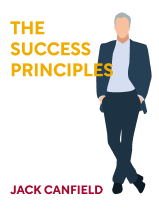

This article is an excerpt from the Shortform book guide to "The Success Principles" by Jack Canfield. Shortform has the world's best summaries and analyses of books you should be reading.
Like this article? Sign up for a free trial here .
Do you believe everyone has a passion? Or is having a passion a prerogative of a lucky few? Do you want to know how to discover your passion?
Passion and enthusiasm can drive you to do your best work and achieve success. These qualities come from within when you do activities you feel passionate about. You also probably have skills and abilities that are so effortless for you that you do them willingly, possibly without charging people. But successful people turn their passion and their “core genius”—what they do best—into their business.
In this article, you’ll learn how to discover your passion, build your time around it, and create a support team to help you along the way.
Identifying Your Passion
Ask yourself these questions to see if you’re following your passion:
- Do I love my work? If I don’t love my work, what would I rather be doing? Would it be lucrative? Successful people find a way to make it work, which means living with less money or turning their passion into a lucrative business.
- What would I do for work if I had all the money I’d ever need from winning the lottery?
- Which activities outside of work make me feel the most connected to other people and myself? Since passion comes from doing activities you enjoy, the best way to connect with your passion is to make these activities your life’s work.
- What am I doing and why do I like it? Try to pinpoint specific qualities or characteristics that you like about the work you enjoy. For example, maybe you enjoy coordinating social activities for your coworkers because you value creating cohesion in a fun environment.
The Passionate Teacher: Rafe Esquith’s Story
Rafe Esquith has taught at the third-largest elementary school in the U.S, Hobart Elementary School, located in East Los Angeles, for over 30 years. Esquith has actively worked to keep his passion for teaching alive, refusing to lose it despite working 12-hour days, six days a week. His fifth-grade students average 50 points higher on math and reading tests than other students at the school. Esquith has taught many children to aim high by having them perform Shakespearean plays. Over the years, his classes have performed in a variety of venues, from local stages to the White House, and graduates have gone on to attend prestigious colleges.
Identify Your Core Genius
Like your passion, focusing on your core genius requires figuring out what your genius activities are and devoting time to them. Follow these steps to identify what to spend more time on in your current job and what to delegate to others:
- List all the business activities that occupy your time. Include small tasks, like photocopying, up through big tasks, like giving presentations.
- From the list, identify up to three activities that represent your core genius—activities you’re especially good at that use your unique talents.
- Identify up to three activities from the list that generate the most income for your company. Plan to focus on the activities that require your unique talents and generate the most money.
Focus on Your Core Genius
Canfield offers two main strategies to focus on your core genius: Delegation and the “Entrepreneurial Time System.”
Delegate
Delegate activities that don’t use your core genius to other people. Though delegation may require training people, it ultimately saves you time by allowing you to pass tasks on to people who like doing them or are more efficient at doing them. Canfield recommends complete delegation of tasks: Assign a repeated task to someone as a part of their role rather than deciding who will do it each time it needs to be done. That way, it’s taken care of automatically, and you’ll be less tempted to do it yourself.
For example, imagine you’re a real estate agent who excels at selling. You currently close one sale a week. You could be focusing your time on closing, but instead, you insist on performing other duties that could be easily delegated, such as writing descriptions of homes or taking photographs for the multiple listing service. If you hired someone for these duties, you could show more homes and close three sales a week.
Here are some tips for delegating:
- Match the tasks you’ve decided to delegate to capable staff members.
- If you’re starting a new business or are the only employee at your company, hire someone to do these tasks. For example, hire someone to manage projects, sales, or social media. It’s easy to find freelancers through sites such as Elance.com.
Use the “Entrepreneurial Time System”
The “Entrepreneurial Time System” helps professionals use their time more effectively by organizing work into three types of workdays:
1. Genius days. On genius days, aim to spend 80 percent of your time working on core genius activities. For example, Canfield’s core genius activities include giving seminars, writing books, speaking, and coaching. Since this work is the easiest and most effortless for you, increase the number of genius days over time.
2. Preparation days. Preparation days are days you spend preparing for genius day work. For Canfield, preparation days might include practicing a speech or presentation he’ll give on a genius day. Scheduling activities like these on preparation days ensures they don’t cut into genius day work.
3. Leisure days. Leisure days are days with no work activities or contact with coworkers. Though you may feel inclined to work long hours without days off, taking time away helps you recharge and return to work able to focus and work efficiently. These days might involve spending time with family or doing a hobby. The only work activity on these days should be dealing with true emergencies like natural disasters.
Leisure should include some time away from your children or spouse. Use babysitters or swap babysitting responsibilities with friends—one day a month, you watch their children and another day a month, they watch yours.
Aim for 130-150 leisure days per year. If you take every weekend off, you’ll already have 104 leisure days, and adding a few long weekends, holidays, and other time off will get you in that range, although it may take time to work up to that number. If you have paid vacation, use it. People can be reluctant to use vacation time—in one study, a quarter of people in the U.S. didn’t use their vacation time, and in another, 57 percent had unused vacation time.
Activity: Implement the Entrepreneurial Time System
To schedule your time around the Entrepreneurial Time System, follow these steps:
- Describe the three best genius days you’ve ever had. Note the common elements, and brainstorm how you can create more time for these kinds of days in your schedule. Repeat for leisure days.
- Talk to your staff, coworkers, and boss about how to make time for more genius days.
- Talk to your family about how to create more leisure days.
- Schedule four or more vacations for the next year. It’s easy to put off taking vacations, so get them on your calendar right away. Leisure days could range from long weekends to weeks.

———End of Preview———
Like what you just read? Read the rest of the world's best book summary and analysis of Jack Canfield's "The Success Principles" at Shortform .
Here's what you'll find in our full The Success Principles summary :
- The 67 principles to help anyone achieve their goals and dreams
- Why achieving your goals requires you to invest your time and effort
- How to take responsibility for your own life







I like the topic i want to learn more..